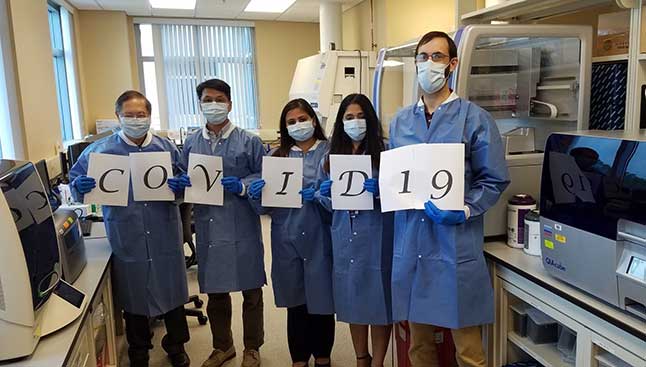
Moffitt’s Molecular Biology Lab Creates Own COVID-19 Diagnostic Test
As cases of COVID-19 increased in our community, so did the need for testing. Moffitt Cancer Center’s Laboratory usually performs various tests for tumors, such as gene mutations, not tests for things like microorganisms and viruses. However, clinicians, pathologists and researchers pulled together the technology and resources the center already had to get a COVID-19 test up and running for Moffitt patients.
At the onset of the pandemic, Moffitt initially sent their patients to testing sites in the community set up through other health systems. “But the sites were inundated with about 500 tests per day and also experienced shortages of tests,” says John Greene, MD, FACP, the chief of the division of infectious diseases at Moffitt. Moffitt then began sending their patients’ samples to external diagnostic laboratories, but the turnaround time was more than two weeks in some cases, which led Moffitt to forge an informal partnership with a neighboring hospital, which offered to test a small group of urgent samples each day.
As the first several weeks of the pandemic proceeded, Moffitt’s pathology department joined forces with the Moffitt Microbiology Lab and the Molecular Diagnostic Lab to develop a solution. The Microbiology Lab has expertise in handling viral specimens, and the state-of-the-art technology of the Molecular Diagnostic Lab performs gene mutation tests for tumors. The teams collaborated and worked diligently using various resources to set up in-house testing of COVID-19 for Moffitt patients. The Microbiology Lab does RNA extraction while the Molecular Lab does the rest of PCR testing and Moffitt now gets results back the same day.
“The entire cancer center was mobilized for this,” said Dahui Qin, MD, PhD, medical director of the Morsani Molecular Diagnostics Laboratory.
“Because the coronavirus that causes COVID-19 is new and the viral test is new to our lab, we reached out to internal and external experts for advice on how to do this test safely,” Dr. Qin said.
The materials needed for testing—including swabs, as well as chemicals and other substances needed to conduct the laboratory test—are the same reagents used in other standard laboratory testing, such as viral titers for patients about to receive a bone marrow transplant.
The labs identified and obtained the proper COVID-19 test kit and positive samples and worked quickly to validate the test in about five days, enabling testing to kick off on-site at the cancer center for Moffitt patients.
The test is called a polymerase chain reaction, or PCR. If Moffitt clinicians suspect a patient has COVID-19, they take a sample from the patient’s nasopharynx. The swab is sent to the Microbiology Lab, where technologists extract ribonucleic acid, or RNA, from the sample and test for the virus. It takes about two hours to run the real-time PCR part of the test, and depending on when the test is run, patients get results the same day or the next day.
“Testing has ramped up dramatically so that we can actually run a larger number of tests and get results back the same day. We are doing around 150 daily as of April 2020,” said Dr. John Greene.
The PCR test is more accurate than the much-publicized rapid five-minute tests, which received emergency-use authorization from the U.S. Food and Drug Administration (FDA) at the end of March. The rapid tests look for a specific antigen and carry a higher risk of false negative results.
“If the result of a rapid antigen test is positive, you can stop there and be treated,” Dr. Greene explains. “But if it’s negative, it’s not really a guarantee that you don’t have the virus. You would need to have a more sophisticated test like the PCR.”
No matter the testing method, someone with COVID-19 can still test negative if the concentration of the virus inside the body isn’t high enough at the time of the test. If symptoms persist and an individual is retested after the virus has multiplied over several days, the test could turn positive.
Moffitt’s lab also runs control tests alongside the COVID-19 test to make sure the test is running correctly and to help identify any false positive or false negative results. Additionally, Lab and Infection Prevention must report every COVID-19 test performed to the Florida Department of Health.
With rapid growth in the number of people infected with the virus in the U.S., the dynamics of testing for the coronavirus and how Moffitt Cancer Center is handling everyday operations has also changed. Impacts include postponing screening procedures, such as colonoscopies, and some non-urgent surgeries.
According to the American Society of Clinical Oncology, there is no specific guidance for testing patients with cancer for COVID-19. Patients who feel they need to be tested should follow their local and state public health directives and guidance. The Centers for Disease Control and Prevention (CDC) does not mention cancer patients specifically in its guidance on prioritization for coronavirus testing. “Clinicians should use their judgment to determine if a patient has signs and symptoms compatible with COVID-19 and whether the patient should be tested,” the CDC states.
Patients at Moffitt are told to call their oncologist if they have symptoms of COVID-19. Moffitt is committed to the health and safety of our patients, their families, visitors and our team members. We are taking all necessary precautions consistent with the advice from the CDC. In addition to the on-site testing, we have enhanced our protocols and are screening all patients at the entrances of all Moffitt’s patient care buildings. We believe Moffitt is the safest place for cancer patients to receive the best care.
To refer a patient to Moffitt, complete our online form or contact a physician liaison for assistance or support. As part of our efforts to shorten referral times as much as possible, online referrals are typically responded to within 24 - 48 hours.
